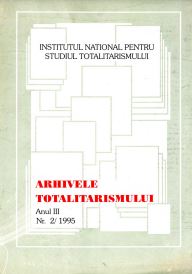Dictionar Biografic
Biographical Dictionary
Author(s): Dan Cătănuş, Alina Tudor, Florinel Marian, Dan Dungaciu, Florian TănăsescuSubject(s): Military history, Political history, Social history, Recent History (1900 till today), History of Communism, Fascism, Nazism and WW II
Published by: Institutul National pentru Studiul Totalitarismului
Keywords: biographies; Gheorghe Arsenescu; Vasile Christescu; Alexandru Lapedatu; Mihail Manoilescu; Lucrețiu Pătrășcanu;
Summary/Abstract: Gheorghe Arsenescu (1907-1962) Colonel Gheorghe Arsenescu distinguished himself in the battles on the Eastern Front, particularly during the war in Crimeea. Retired in 1947, he joined the anti-communist resistance movement, becoming the leader of "Haiducii Muscelului" (The Muscel Outlaws), active on the southern slopes of the Făgăraș Mountains. He had many confrontations with the Securitate forces during 1948-1949. Betrayed, he was arrested at the beginning of 1960, tried and executed in 1962. Vasile Christescu (1902-1939) Having joined the Iron Guard Movement at the beginning of the '30s, Vasile Christescu was promoted to the leadership of the Legion after Comeliu Zelea-Codreanu was captured in 1938. Successful in his escape from a military escort, together with Alexandru Cantacuzino, Christescu became a pillar of the new leadership of the Guard. On 26 January 1939, in an encounter with the authorities, Christescu was shot to death by one of the arresting police officers. Alexandru Lapedatu (1876-1950) A historian and a liberal politician, Al. Lapedatu developed a remarkable activity, five decades long, in editing Romanian medieval documents and contributing to the preservation of the national historical patrimony. A university professor and member of the Romanian Academy, in 1948 Al. Lapedatu was ousted from the Academy and imprisoned in 1950. He died in the penitentiary at Sighet. Mihail Manoilescu (1891-1950) A remarkable financial expert in the inter-war period, Mihail Manoilescu was a fervent advocate for the corporate doctrine. He published a number of volumes, such as Peasantry and Democracy, 1922; Neoliberalism, 1923; Le parti unique, 1937; The Role and Destiny of the Romanian Bourgeoisie, 1942. On 4 July 1940, he was appointed minister of external affairs, and as such, he signed the documents of the Vienna "arbitrage" on 30 August 1940, by which North-Western Transylvannia was relinquished to Hungary. On 12 October 1949, he was arrested and detained without a trial for one year and two months. Arrested again on 19 December, 1948, he was sentenced to 15 years' hard imprisonment, 10 years' civic dishonour and his entire property was commandeered by the authorities. He died in prison at Sighet, on 30 December 1950. Lucrețiu Pătrășcanu (1900-1954) Lucrețiu Pătrășcanu became a socialist in 1919, while still a student. With studies in political economy, philosophy, statistics and law, he was among the few communist intellectuals of the period. His was a distinct attitude due to his nationalist position, at variance with the internationalism of the communist party, and the grounds for his dismissal from the position of Minister of Justice and subsequent arrest in January 1948. The inquiry ended in 1954 when he was sentenced to death. He was executed by the firing squad on the night of 16/17 April, 1954.
Journal: Arhivele Totalitarismului
- Issue Year: III/1995
- Issue No: 2
- Page Range: 186-201
- Page Count: 16
- Language: Romanian
- Content File-PDF

